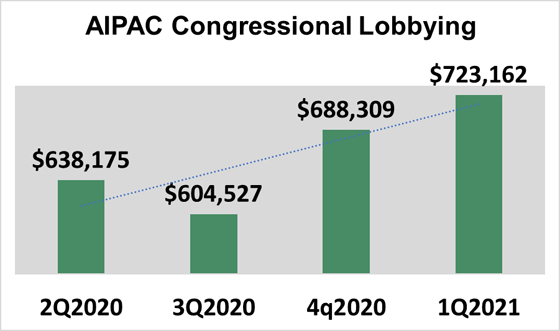The American Israel Public Affairs Committee (AIPAC) continues to lobby Congress for more support for the so-called “Abraham Accords.” This Trump administration initiative sought to transcend the spectacular failure of the “Deal of the Century” initiative that called for Palestinian acquiescence to annexation and renunciation of sovereignty rights in exchange for vague and uncertain economic development projects. After Palestinians rejected the deal, the Trump administration pivoted to forging a string of spectacularly corrupt deals with Arab dictatorships. The so-called Abraham Accords attempt to fracture their formerly unified but tepid and inconsistent opposition to recognizing Israel until there was just solution to the violent settler colonization and expulsion of Palestinians that brought Israel into being.
To date UAE, Bahrain, Morocco and Sudan have signed onto the Abraham Accords because of corrupt “side deals” that further degrade the already rock-bottom international reputation of the United States. The deals accurately boost the perception that Israel’s U.S. lobby exercises vast and undue influence over American foreign policy. There was initial hope that the Biden administration would take a principled stand and refuse to honor the side deals. That hope has been dashed.
For UAE the side deal was approval of a $23 billion advanced jet fighter sale to UAE. On April 13, 2021 the Biden administration approved the deal. Members of the Israel affinity ecosystem such as the American Jewish Committee are fighting hard for the Biden administration to not abandon other equally unsavory Abraham Accord side deals.
Sudan signed onto an accord in a joint ceremony with former Treasury Secretary Steve Mnuchin after the US promised to remove Sudan from its list of state sponsors of terrorism. This “removal in exchange for Israel recognition” revealed yet again the entirely political, rather than fact-based, nature of such US designations. The US further promised a $1 billion bridge loan to help move Sudan back into the realm of acceptable international borrowers.
In the case of Morocco, the “side deal” was recognizing Moroccan sovereignty over Western Sahara. When Spain left its former desert colony in the 1970s, Morocco secretly negotiated to take over half the territory with the other going to Mauritania. An ensuing guerilla war by Western Sahara inhabitants and Morocco’s occupation led to the deaths of tens of thousands.
The Trump administration exited a longstanding policy of considering the area disputed territory and intervened to recognize Moroccan sovereignty over Western Sahara. The overarching reason was to win Morocco’s signature on an Abraham Accord rather than any US interest or new diplomatic breakthrough. The US thus became the only country in the world to recognize sovereignty, while upending any hope for UN efforts to secure a more just and fair outcome. In January David Schenker, Assistant Secretary of State for Near Eastern Affairs opened a US consulate in occupied Western Sahara, even as Western Sahara renewed a request for U.N. membership. The US also pledged $5 billion in US International Development Finance Corporation funds to Morocco. The US State Department under Anthony Blinken has “welcomed Morocco’s steps to improve relations with Israel and noted the Morocco-Israel relationship will bring long-term benefits for both countries.”
The irony is, that even as American pundits continue to fret over Russian and Chinese influence, Israeli foreign influence in the US has only grown. The American Israel Public Affairs Committee (AIPAC) quietly raised $1.1 billion over the past decade to advance Israeli government policies from within the US. Far too few Americans know AIPAC was ordered to register as an Israeli foreign agent in 1962 when it operated as the unincorporated lobbying division of the American Zionist Council. This order came after millions in Israeli funds gushed into US public relations and lobbying campaigns.
Although AIPAC directors maintain close and ongoing ties to Israeli government officials in order to better translate their aid and policy requests into US law, the US Department of Justice has long refused to properly enforce its own order and regulate the lobbying group under the Foreign Agents Registration Act. Combined with overt coordinated and stealth political action committees funding Congressional candidates, AIPAC has achieve massive undue foreign influence over Congress, making Israel the leading recipient of US foreign aid, even though it is unlawful under US law regulating aid to rogue nuclear weapons states. Although US opinion polls continually signal public opposition to foreign aid to Israel, Congress remains captive to what historian Walter Hixson has recently determined is “the most powerful lobby advancing the interests of a foreign country in all of American history.”

It is doubtful the US would have recognized Moroccan claims over Western Sahara if Israel and its US lobby had not gotten involved. AIPAC is now quickly advancing relations operating almost as a “shadow” US State Department. On May 6, AIPAC will hold a three-way video conference between Morocco’s Minister of Foreign Affairs Nasser Bourita and Israel’s Minister of National Infrastructure, Energy and Water and the Israeli Ministry of Defense and an official from Nobel Energy which is developing liquid natural gas from the Israeli Leviathan fields. AIPAC has ramped up Abraham Accord direct lobbying expenditures over the past three quarters as a top priority and it is no wonder why. Most of the proposed US expenditures on the Trump-era “peace” accords were destined to accrue mostly to Israeli recipients.
An opaque fund arranged by the US International Development Finance Corp based in Israel received 25 applications and chose 15 projects for funding. By September of 2020, Israel had three active projects totaling $580 million in US backed loans. In 2019, DFC committed $480 million to two “Egyptian projects” – except they were not truly projects accruing to Egyptian interests but rather schemes to transport and sell Israeli liquid natural gas from the Leviathan fields being developed by Noble Energy. Morocco is now surely in line for even more US taxpayer – backed Israeli energy export projects.
The plurality of Americans would cut aid to Israel after compelling studies released by Israel’s B’Tselem about its apartheid practices and more recently Human Rights Watch. The White House has already dismissed those findings. But even as it touts itself as a leader in racial justice, the unconditional support the Biden administration and Congress give Israel are actions that speak far louder than words.
Grant F. Smith is the director of theInstitute for Research: Middle Eastern Policy in Washington which is co-organizer of the 2022 Transcending the Israel Lobby at Home and Abroad conference at the National Press Club and publisher of the new book “Architects of Repression: How Israel and Its Lobby Put Racism, Violence and Injustice at the Center of US Middle East Policy.”

